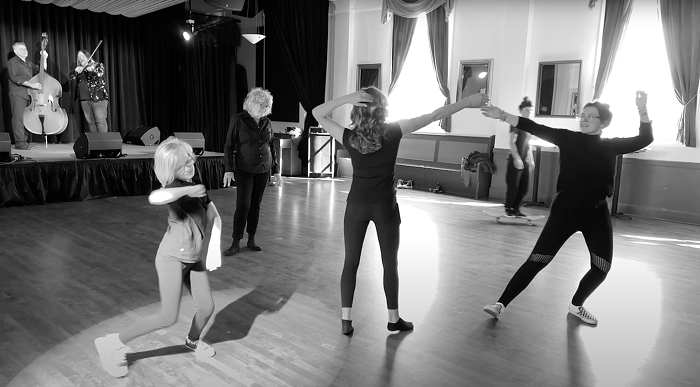FRANCES QUINLAN is determined to make this interview happen.
She and her band, Hop Along, are driving through New Mexico on the way to a show in Albuquerque, and cell service is spotty to say the least. We can't really manage more than a minute or two of decent conversation without the call breaking up and eventually disappearing into the digital ether. But with a level of professionalism I've never encountered from a musician on the road, Quinlan calls me back numerous times, trying from her phone, then from her bandmates' phones—navigating our office's phone system to reach me, resolved to complete the interview.
That dedication and commitment is evident on Hop Along's new album, Painted Shut, one of the most remarkable rock records to come out in 2015. Quinlan, along with Joe Reinhart (guitar), Tyler Long (bass), and her brother Mark Quinlan (drums), whirl up compact tornadoes of sound that contain elements of heartland-style classic rock, the volcanic muscle of bands like Crazy Horse and the Who, and the DIY ethos of punk (in the 21st-century sense of the word). It's all cemented by Frances Quinlan's jaw-dropping voice, which yowls and howls to its outer limits, finding beauty in the distressed, ragged edges of human expression.
When lead single "Waitress" appeared on the net earlier this year, the Philly band seemed to arrive, fully formed, out of nowhere. Of course, that wasn't the case—it's Hop Along's second album as a band; the third, if you count Quinlan's Freshman Year lo-fi folk release under the name Hop Along, Queen Ansleis.
"On our record before this one [2012's Get Disowned], I was speaking from direct experience but I wasn't really able to be direct about it," she says, during one of our good patches of airtime. "I think that album, subject-wise, is very vague. It's hard to understand. And that's okay—it's maybe a little more on the stream-of-conscious poetic side, and I don't mind that, but I didn't want to do that a second time. I really wanted to be more vivid lyrically on this one."
Painted Shut is indeed a direct, immediate experience. Between calmer moments like "Happy to See Me" and "Well-Dressed" are lurching, heavier pieces like "Texas Funeral" and the joyously rocking closing number, "Sister Cities." The gut-wrenching "Powerful Man," meanwhile, is about an experience Quinlan had at age 18 when she witnessed a father abusing his 10-year-old son.
"The things I pull from my own experience," she says, "are things that have taken a long time to gestate, I guess, so I haven't really written about anything that recent. Other than that, I pull a lot from things I read about, or from the experiences of others who are close to me. I haven't really found a way to articulate what's going on right now for me, and I don't really know that I have a desire to do that at the moment."
This is Hop Along's third trip to Portland; their previous two shows were at house venues. While Portland's house-show scene has dwindled since the band last came through, Quinlan reports of Philadelphia's thriving all-ages and house-show scenes, which allow levels of connection and community that remain vitally important to her and the band. It's something they keep foremost in their minds, even as their blog-lauded new record is released by Saddle Creek and a full-time booking agent has routed this current tour for them.
But any fears about Hop Along growing disconnected from their DIY roots seem to be groundless. With Painted Shut, the group displays a level of raw passion that remains incredibly rare among bands with any level of success. And they still have a long way to go before becoming household names. That struggle—between financial solvency and maintaining one's sense of self—crops up on the album, particularly in songs about folksinger Jackson C. Frank and jazz musician Buddy Bolden, both groundbreaking musicians who tragically died without the level of recognition they deserved.
"The unfortunate thing is that money determines so much in terms of what happens to you, talent or no. Money determines a lot, unfortunately," Quinlan says. "And there's so much to talk about within that. You can go anywhere just thinking about that concept. So it's not that it's a concept album, but that idea is always sitting with me—the influence of money, especially now as I get older and think about being able to take care of my parents and myself."



















